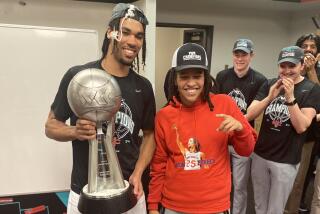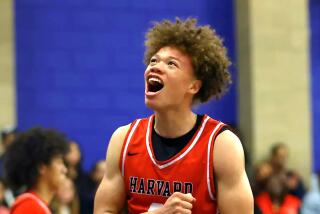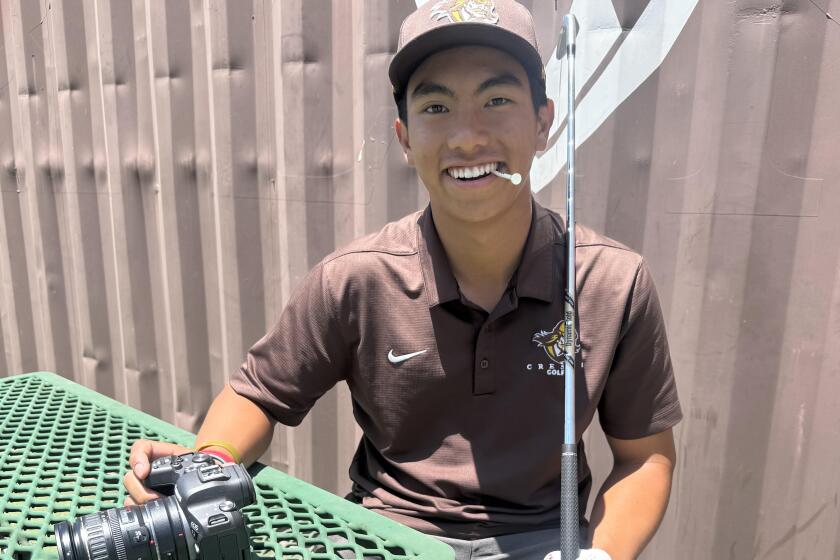Dinkins Doesn’t Yield to Adversity
- Share via
When she was 14, her father died suddenly.
At 15, she was the only bone marrow match that her sister could turn to in a battle against sickle cell anemia.
Then she ripped a ligament in her right knee, sidelining her for the season.
Today, at 16, Laura Dinkins is having the best basketball season of her tumultuous life, averaging 11.3 points and 11.3 rebounds as a starter at guard for Rialto Eisenhower High, The Times’ 20th-ranked girls’ team.
But those stats, as well as her 3.5 grade-point average, are only part of the reason Dinkins has become an inspiration to those who know her.
“She’s one of those kids,” Eisenhower Coach David Wolfe says, “who keeps you in education.”
He was supposed to be in the bleachers, cheering for her when she made the Eisenhower varsity. That was the deal Dinkins had with her father, David Edwards, who practiced with her, took her to see the Lakers, and needled her about someday making it in the WNBA.
But only weeks after learning his daughter would be playing varsity as a freshman, Edwards died of a stroke in September, 1999.
Grief-stricken and confused, Dinkins wondered whether she should continue playing basketball, a passion she so closely shared with her father. For two months, she would go home after school and close her bedroom door.
And cry.
“It’s something I wanted to do with him by my side,” she said. “I thought about it every minute of the day ... I really didn’t want to play without my dad being there to see my progress.”
But that would have gone against her father’s wishes. Although she played sparingly, she finished her freshman season on a strong note, averaging 12 points and eight rebounds in three playoff games.
The next summer, Dinkins, one of six children ages 13 to 30, learned that her younger sister was dying. The family had known since Deanna was a toddler that she had sickle cell anemia. But it wasn’t until the summer of 2000 that they were told she would likely die without a bone marrow transplant.
And Dinkins was the only match.
Floyd Eddings, an assistant at Eisenhower who began taking Dinkins under his wing, was enlisted to tell Dinkins about her sister’s worsening condition--and how she could help.
“He told me that Deanna was probably going to die if she didn’t have the transplant, if I wasn’t willing to help her out,” Dinkins recalled.
But she was frightened. Of the needles involved. Of the guilt she would feel if the transplant didn’t succeed.
“I knew I had to be willing to help her, but I went back and forth for about three days about not doing it. I’d say yes, and then no, and then yes, and then no. I was scared. I wasn’t sure what the effect was going to be on me, or her, if she rejected it,” Dinkins said.
“I had already lost my dad, and if I didn’t help my sister, I was going to lose her too. That was the bottom line.”
The transplant, for the most part, has been a success. Deanna has suffered a series of afflictions, including a shrinking jaw and severe blistering in her mouth and throat that has required regular hospital stays, but her prognosis is good. Hip replacement surgery is also planned after she is taken off an aggressive steroid treatment.
“For the first time, she’ll be a normal kid,” Vivian Edwards said of her daughter. “She’s had to endure a lot. She’s still enduring.”
As is Dinkins.
While her mother works for Kaiser Permanente Medical Center, Dinkins oversees her sister’s care. Every few weeks, Deanna feels well enough to watch Dinkins play.
“There’s not a lot of people, especially 16-year-olds, who have a little sister who goes through all this,” Deanna said. “[But Laura] still keeps her cool and functions with everything that’s going on.”
Three weeks after donating her marrow, Dinkins suffered a torn anterior cruciate ligament and meniscus in her right knee during a summer tournament game.
Her sophomore season was almost entirely lost. She played in only the last two games--one of them a playoff upset of Chaffey in which she sparked a comeback by contributing eight points and six rebounds off the bench.
It wasn’t until this, her junior season, that Dinkins has stayed healthy and enjoyed the kind of consistent success she and her father envisioned. Her team plays at home tonight against Etiwanda in the second round of the Southern Section’s Div. 1-AA playoffs.
It’s not so much what Dinkins has been able to accomplish, as it is how she’s gone about it that is most impressive. For example, when she sat out last season, Dinkins still watched every practice. She also filmed the games and passed out water during the breaks. She boosted her grades and also her team’s morale, then put in the extra work it took to get back into playing shape for this season.
“She works very hard for her academic and basketball success,” Wolfe said. “She’s not the fastest, but she’s our best defender. She’s not the best jumper, but she can lead us in rebounding. She’s not the best shooter, but she can figure out a way to score.”And figure out a way to cope.
“I admire how strong she is to keep going,” said Jasmine Clarendon, a teammate. “She’s strong-hearted, brave, outgoing, serious. I don’t think most high school kids could handle it.”
Dinkins credits Clarendon, a classmate, for helping her “emotionally and basketball-wise” when she was struggling her freshman year.
“There were times I wanted to quit, but she kept pushing me through,” Dinkins said. “I really kept to myself, I didn’t have a lot of friends. She gave me peace of mind and comfort. She’d give me a hug and let me know that everything was OK. That really helped.”
Eddings, a former NFL receiver, also played an important role in Dinkins’ emotional journey.
“She’s relentless in her effort to learn things. She never gives up, she keeps asking questions,” said Eddings, whose close relationship with Dinkins led to an unexpected relationship: He became engaged to Vivian Edwards on Friday.
“A lot of kids don’t show an appreciation for things, but she alone makes up for all those other kids because she appreciated things so much,” Eddings said.
Now, Dinkins appreciates the memories. She recalls fondly the day after a summer league game when she and her father learned together she would be playing varsity basketball.
“I think that’s the happiest I had ever seen him,” Dinkins said. “He was so happy I was going to play varsity, and he told me to keep working hard and never give up.”
More to Read
Get our high school sports newsletter
Prep Rally is devoted to the SoCal high school sports experience, bringing you scores, stories and a behind-the-scenes look at what makes prep sports so popular.
You may occasionally receive promotional content from the Los Angeles Times.






